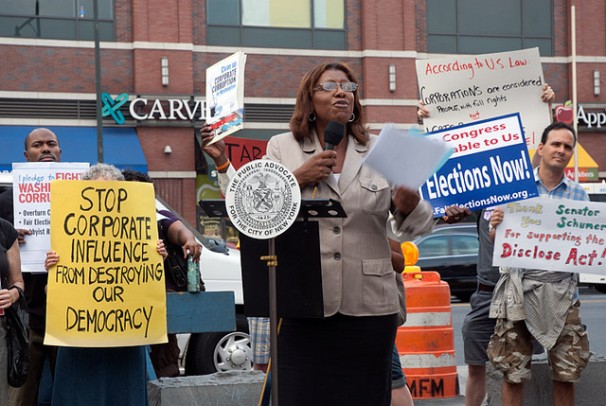
New York City’s government finds itself still functioning amid the U.S. government shutdown. A runoff for the Democratic public advocate candidate was held on Tuesday, Oct. 1 between New York City Councilwoman Letitia “Tish” James and New York State Senator Daniel Squadron. James won with 59.6 percent of the vote over Squadron’s 40.4 percent with 99 percent of precincts reporting, as of press time, and will run uncontested for public advocate in November.
Kyle Tiemann-Strauss, a Steinhardt sophomore, was happy James won.
“I think James offers the better vision for the office, given her track record of standing up to powerful forces like the real estate industry and the Bloomberg administration,” Tiemann-Strauss said. “I’m also enthusiastic because of her support of Occupy Wall Street, being one of four politicians to file a lawsuit against the NYPD for their treatment of activists. Her background as a true activist and fighter for working people surely positions her as the ideal public advocate.”
James has been a City Council member since 2003. In 2007, she authored the Safe Housing Act which gives families in rental housing access to quick and complete repairs to their apartments. Currently, she chairs the Committee on Economic Development and the Committee on Sanitation and Solid Waste Management. She is most known for her firm stance against Mayor Michael Bloomberg’s poor response to the 2010 blizzard and for her strong opposition to NYPD’s stop-and-frisk policy. She is a Brooklyn native.
New York City’s public advocate is one of three offices in New York City’s executive branch — the mayor, the comptroller and the public advocate. The public advocate’s job is to review how citizens receive city services. The office may also write and sponsor legislation in the city council and sue the city government on behalf of the people. Bill de Blasio, the current public advocate and Democratic mayoral candidate, has spent his tenure compiling a list of poor landlords which is published on the public advocate office’s website. He also spent time improving public education by sponsoring city council bills such as a 2012 bill that proposed a tax on higher income brackets to create $500,000 for prekindergarten and after-school activities.
This runoff, however, cost the city $13 million. The office only has a budget of $2.2 million. Some pundits have argued that this is a waste of city resources.
“We don’t do [runoffs] for city council races,” Jonathan Greenspun, a managing director of Mercury LLC., said in a Sept. 30 NY1 broadcast. “We shouldn’t do it for public advocate.”
However, Michael Tobman, a political consultant for NY1, disagreed and said in the same broadcast that the spending is a part of the democratic process.
“You can’t decide to have a runoff or not have a runoff,” Tobman said.
Tiemann-Strauss agrees that this runoff is just part of the democratic process.
“To complain about the price of an election is, to me, a bit strange, given that citizens must be provided with the means to elect their representatives,” Tiemann-Strauss said. “I think the more comment-worthy aspect of this is the way in which the primaries function, requiring one candidate to attain a plurality, which engenders these runoff elections.”
Some people suggested reforming the runoff process altogether, like NYU politics professor Steven Brams, who co-authored an article in the Journal of Theoretical Politics in 2011 with D. Marc Kilgour of Wilfrid Laurier University’s department of mathematics, calling mathematical approach to counting votes to avoid runoffs.
“Instead of specifying some minimum percentage (e.g., 50) that the leading candidate must surpass to avoid a runoff (usually between the top two candidates),” the article said, “we propose that the number of contenders depends on the distribution of votes among all candidates.”
Patrick Anker is a contributing writer. Email him at [email protected].











































































































































